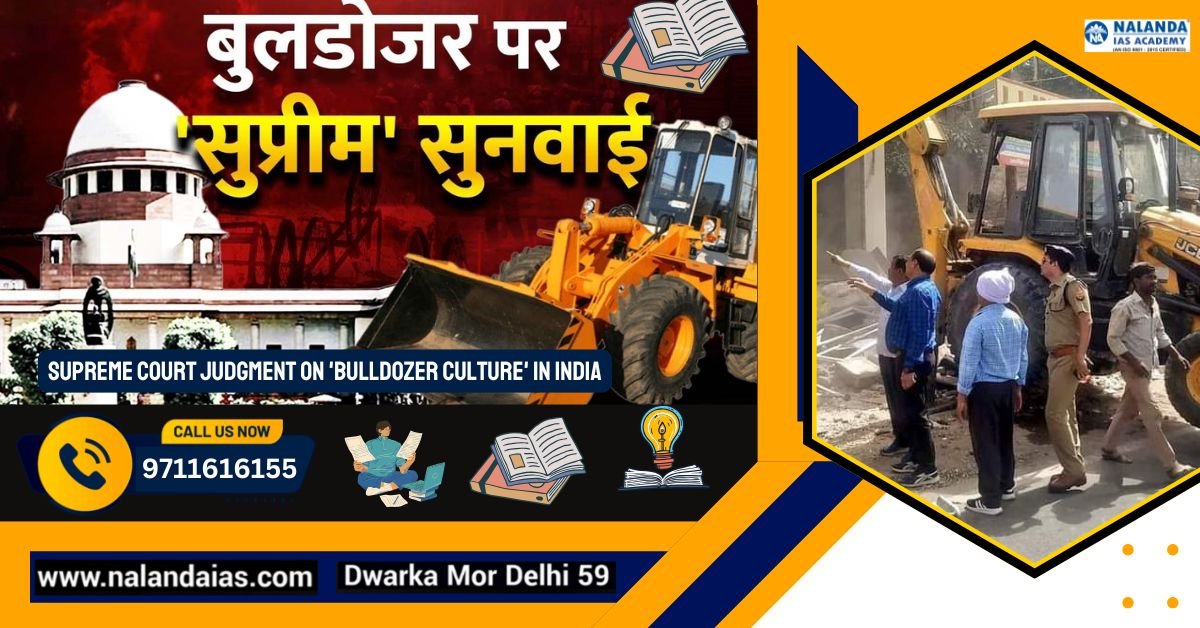Supreme Court Judgment on Bulldozer Culture in India

Background
- The Supreme Court recently criticized the trend of demolishing the properties of individuals accused in criminal cases, often labeled as ‘bulldozer culture,’ and condemned the States for this approach.
- This judgment was in response to petitions from various States, such as Uttar Pradesh, Madhya Pradesh, and Rajasthan, where properties were allegedly demolished as punitive measures against accused persons without following due process.
- The court emphasized that such actions are contrary to the principles of natural justice and due process, essential elements of the ‘Rule of Law.’
Supreme Court Judgment on Bulldozer Culture in India
Key Observations by the Supreme Court
Abuse of State Power:
- The court noted that the actions of the States resembled a “might is right” philosophy, undermining the rights of citizens by depriving them of shelter without trial.
- Justice B.R. Gavai remarked that such actions without following due process amounted to “anarchy” and a “lawless state of affairs.”
Protection of the Innocent:
- The judgment highlighted that demolishing homes of accused persons also punishes innocent family members who may live in or co-own the property, violating their rights under Article 21 (Right to Life) of the Constitution.
- The court reminded the State that an accused person is “innocent until proven guilty.”
Violation of ‘Rule of Law’ and ‘Basic Structure Doctrine’:
- The court warned against the executive acting as both judge and enforcer, bypassing the judicial process, which violates the ‘Rule of Law’ embedded in the Constitution’s Basic Structure.
Separation of Powers:
- The principle of separation of powers was highlighted, as only the judiciary has the authority to determine guilt or innocence.
- The State’s action of demolishing property without judicial approval amounts to excessive punishment.
Supreme Court Judgment on Bulldozer Culture in India
Binding Directives Issued by the Court
The court, under Article 142, issued specific directives to ensure accountability:
- 15-Day Notice Requirement: A 15-day prior notice must be given to occupants before demolition, detailing the nature of alleged violations.
- Grounds for Demolition: Notices must include specific reasons for demolition and any unauthorized construction claims.
- Opportunity to Appeal: Occupants must have a fair chance to challenge the demolition before a designated authority.
- Reasoned Final Order: The authority’s decision must be well-reasoned.
- Videography of Demolition: Demolitions must be documented on video for accountability.
Accountability of Public Officials
- Contempt of Court and Prosecution: Officials violating these directives may face contempt proceedings and could be prosecuted.
- Restitution: They may also be held accountable for restoring demolished properties if found at fault.
Institutional Accountability and Judicial Oversight
- The court stressed the need for institutional accountability when public officials infringe upon individuals’ rights arbitrarily.
- The State must prove in court that demolitions were not intended as punishment for accused persons.
Important Insights for General Studies
- Impact on Right to Shelter: The court underscored that a house represents stability, security, and dignity, making its arbitrary demolition a severe violation of human rights.
- Due Process of Law: This case reiterates the importance of due process in the judicial system and highlights the judiciary’s role in protecting fundamental rights.
- Doctrine of Proportionality: Any action taken by the State, even against convicts, should not be excessive and should align with principles of proportionality and fairness.
Implications for UPSC Mains
- GS-II (Polity and Governance): This case provides insights into judicial activism, the role of the judiciary in protecting citizens’ rights, and the importance of due process.
- GS-II (Separation of Powers): The judgment highlights the boundaries of executive and judicial authority, illustrating how the separation of powers is essential for democracy.
- Essay Topics: Themes such as “The Rule of Law and Democracy,” “Judicial Activism and Fundamental Rights,” and “State Power vs. Individual Rights” can incorporate aspects of this landmark ruling.
Key Takeaway
This judgment strengthens the legal safeguards against arbitrary State actions and reinforces the importance of judicial intervention in protecting citizens’ rights, upholding democratic principles, and ensuring accountability.
Supreme Court Judgment on Bulldozer Culture in India
Supreme Court judgment on bulldozer culture
Rule of law and bulldozer demolitions
Due process in property demolitions
Right to shelter and bulldozer action
Article 142 and Supreme Court directives
Separation of powers and State overreach
Fundamental rights in property demolitions
Institutional accountability in bulldozer culture


